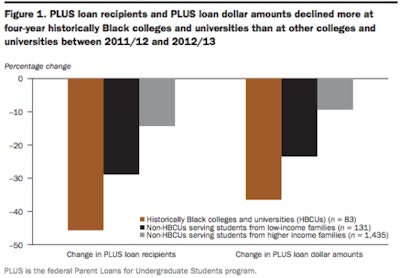
The Department of Education recently acknowledged that the controversial 2011 changes to Parent Plus Loan qualification standards did, in fact, adversely affect historically Black colleges and universities.
In a report released last week, the department acknowledged that, for the 2012-2013 school year—the first full school year the changes were effective—“PLUS loan amounts declined substantially at HBCUs … and they were not fully replaced by other federal aid,” as department officials previously claimed. The report’s authors found that “At HBCUs the share of families with PLUS loans declined 46 percent, and the dollar amount of PLUS loans fell 36 percent,” which was more than the decline experienced by other institutions. The trend was inconsistent with a previous upward trend.
U.S. Education Secretary Arne Duncan had previously admitted that the revised Parent Plus Loan policy had unintended consequences for HBCUs, but the extent of the impact had not been quantified.[/caption]The report looked at the impact of the policy on HBCUs, other non-HBCUs serving predominantly low-income students and other non-HBCUs serving students from higher income families and found that the adverse impact to HBCUs was significantly greater than the impact on any other institution, even when adjusting for income. Only one-tenth of the decline in PLUS loans at HBCUs was compensated with an increase in other types of federal loans.
The report also found an average of 3.4 percent decline in enrollment at HBCUs across the country as a result of the PLUS loan changes—a larger decline than experienced by other institutions in the same period.
“The research confirms what we all already knew, and not just on the impact of students, but what it’s done to the institutions and then subsequent populations,” said Johnny Taylor, president and CEO of the Thurgood Marshall College Fund.
The report found the decline had the most impact on first-year students, a trend Taylor said he saw coming.
 U.S. Education Secretary Arne Duncan had previously admitted that the revised Parent Plus Loan policy had unintended consequences for HBCUs, but the extent of the impact had not been quantified.
U.S. Education Secretary Arne Duncan had previously admitted that the revised Parent Plus Loan policy had unintended consequences for HBCUs, but the extent of the impact had not been quantified.














